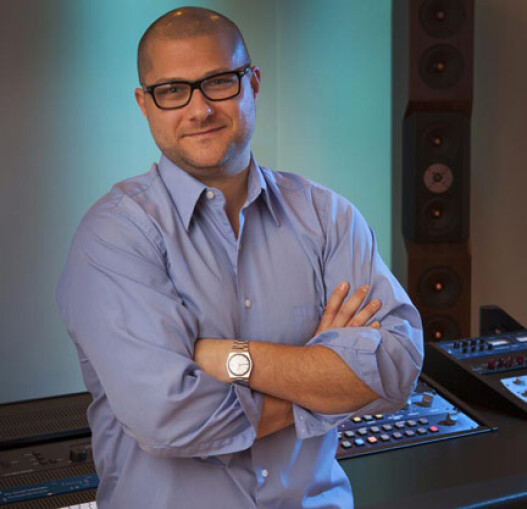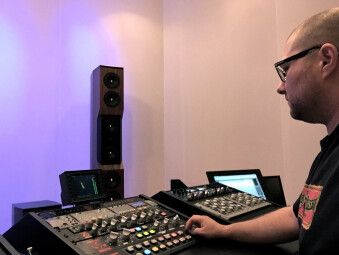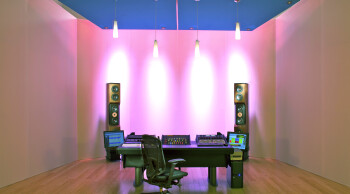Colin Leonard, owner and engineer of SING Mastering in Atlanta, has to be ready to handle any musical style that comes his way. “I could go from Gaelic Christmas music to hardcore hip-hop to pop to heavy metal in the same day,” he says. “it's totally different all the time.” Leonard’s credits range from Justin Bieber to Mastadon to newer groups like Echosmith and Kimbra to bands from the bustling Atlanta indie rock scene. Many of his projects are for major record labels like Sony Music, Warner Brothers, and Universal Records, among others.
Leonard’s spacious mastering studio is focused around analog processing, featuring a range of high-end EQs, often modded to his specifications, including a pair of customized Neumann EQs that were originally designed for vinyl mastering, a custom Motown-style Electrodyne inductor EQ, a Fred Forssell Millennia NSEQ-2, an SPL PQ, and a Dangerous Music BAX and other pieces from Manley, Pendulum and Prism. The hub of his studio is a Dangerous Music Master mastering insert console.
Audiofanzine recently had a chance to speak with Leonard about his gear, his techniques, mastering for iTunes, and more.
Because you deal with so much stylistic variety, do you ever have to do research to prepare for sessions?
A big part of the job is staying on top of what the trends are for the different genres. And I do that constantly. I actually buy a lot of CDs and study them. One thing that I learned in mastering — and in music in general — that kind of took me a long time to realize, is that there are these kind of slow-moving trends that happen, and you’ve got to stay on top of them. And they’re very small in mastering. Like you’ll go through a year of a “mid-range push” trend. Or there’s a hi-fi push, or a distortion craze, which I think we’re still in the tail end of right now, where everything’s distorted a little bit with harmonic distortion. And now I think it’s kind of moving out of that and going to more of a clean, hi-fi sound. So it’s interesting kind of following that.
How do these trends start?
I think it moves really similarly to clothing fashion. It takes a while to follow but I basically just try to stay up on it. My mastering is more about the vibe of the music than technically being perfect. I think it’s so much more important. I started off as a musician, too, and I still try to have that mindset, even though it’s technical at the same time.
The “loudness war” has been heavily covered in the music media over the last few years. I gather that the iTunes standards are making it so you don’t have to push the masters as loud. Is that true? What’s your feeling on that whole issue?
I think it’s kind of in a state of flux. There’s been a lot of press about it, and people like to read about it, and people get emotional about it, but it’s something that’s been going on since the beginning of recorded music. This isn’t a new thing with digital. It’s been going on forever. Back in the vinyl days, a record label would send out a single to three different vinyl-mastering cutters, and they’d get the test pressings back and they’d pick the loudest one. So it was, who can get it louder on the lacquer?
Back to iTunes for a second, my understanding is that the Sound Check feature levels everything off everything anyway, so it kind of takes the incentive away from trying to make everything as loud as possible. Is that a fair reading of it?
Yeah, if you use Sound Check on your library, it will kind of average everything out. I think it makes it more pleasurable for the listener when stuff isn’t jumping around. It’s like when you watch a movie and you have to ride the volume the whole time.
What delivery medium do you master for the most?
I just master it to make it sound as good as possible.
You don’t have to compensate depending on if it’s going to MP3 or some other format?
I’ll think about that. I’ll make a separate master for iTunes that will be sent as a 24-bit file — better dynamic range and a little more headroom.
How does the iTunes master differ?
It’s turned down a little bit, and it’s a higher resolution file. So when it’s converted to AAC at 256 kHz, it won’t create overing with the compression algorithm. Because if you give it to them at 0 dB peak -and the same thing will happen with an MP3 encoder — it will create overs from the [data] compression.
What is the peak level you like to master for iTunes or MP3?
For iTunes, it kind of varies depending on the song. Maybe it’s turned down a dB or so. It’s not much, it’s just enough to compensate for the encoder. Because you’ll notice if you take a WAV file that’s not overing and convert it to an MP3 file, it will start overing immediately.
So all one needs is a tiny bit of headroom in order to avoid overs during encoding?
Yes, but it depends on how loud the master is, so you should check the particular song.
I assume you do get a lot of projects that at least partially, or totally were recorded in home studios?
Yes.
Do you notice a big difference these days, with current gear and software, with those and music done in commercial studios? And if so, what are the biggest problems you find on the home-recorded projects, typically?
You know it’s interesting for me, when the home stuff really started taking hold, around maybe 2008, there was a definite dip in quality. But now, I think some of the home guys are getting better with their home gear. And I’ve noticed that it can be really good, or not. It’s really a skill set that people have developed. And now more artists have developed a skill set to be able to record themselves well. And then a lot of times they’ll send it to a good professional mixing engineer.
I guess I was thinking more about the difference in acoustics and the ability to have a great selection of quality mics, as opposed to a home person who probably only has a few. They’re not going to be able to have a U47 and a C12. So has that impacted things, because what’s going in on the front end isn’t as clean?
I think some of the quality has fallen off a bit on certain things, but there’s so much music coming out now, that some of it is still really good. So what’s hard is that there’s a bigger variance now — you know, different levels of quality. Whereas when I first started, I was seeing more of a consistent level of quality. And I’ll check people’s mixes, and if they ask me to give my opinion on what I think, I will, if they’re trying to improve their skills. And that’s part of what’s cool about a professional mastering studio is that people can come in, and they can sit and listen to their music in a controlled environment and talk about what they can do on the next project to make it better.
Let’s talk about your studio. What do you use for monitoring?
I have a pair of custom Tyler Acoustics D1 speakers. The drivers are custom designed for the speakers. The guy that designed the drivers built custom crossovers for me, with really high-quality parts and high-quality wire. And the room is also really natural and flat. And then there are two custom Tyler Acoustics subs, those are servo drive, and they’re designed by Danny Richie, who designed the drivers in the speakers. And then two Pass Labs [Pass Laboratories] amplifiers.
So you’ve gotten to the point where you hear something in your studio and you know that you’re hearing what it really sounds like.
Yeah, definitely. It’s very flat and you can really hear everything that’s going on. The room is very natural. It’s got an insulated, dead front end. There’s acoustic material all the way around the front, and acoustic clouds. It’s over 30 feet long and the ceiling is very tall, and I’m quite a ways from the speakers. It’s a live back end of the room with a lot of diffusion.
You have a number of pieces of hardware from Dangerous Music?
Yes, I’ve been using Dangerous Master from the beginning and within about the last five years or so I added a Dangerous Monitor and a Dangerous BAX EQ.
Talk about Dangerous Master
It’s a fantastic stereo mastering insert console. It’s basically a really fancy channel strip from a recording console that’s stereo, with separate left and right controls, a lot of headroom and a very high-quality signal path. So this is the mastering console in my opinion, it’s super transparent. It controls the insert sends and returns from whatever analog gear I want to send to. It also has a mid-side circuit built in, so I can control the level of the side-to-mid mix so I can control the stereo field separately. I have a couple of different versions of these. They are very reliable and transparent.
What are some of the EQs you use?
I have a couple of Neumann cutting-console EQs that are totally customized. These are from an old Neumann cutting lathe console. They originally have [knobs with] 2dB steps, and they’re modded for 1/2 dB. They’re very cool and the midrange is awesome. They have transformers and they also have a really cool custom linear power supply. I have another set of a similar EQ that looks the same, and that’s called an OE Duo, that’s a stereo EQ. It’s also another cutting EQ. This one is also modded with the 1/2-dB steps and the linear power supply. So it’s is a little more transparent, and sounds amazing. I have an SPL PQ which is a monster 120-volt rail, discrete Class A equalizer. It sounds really good.
One of the things that amazes me about mastering is that you’re dealing, with a stereo master but sometimes you have to make adjustments that target individual elements within that mix. I guess MS processing would be one of the tools. Can you talk about some of the ways you go about that?
I never really do the same thing. It really depends on what’s going on in the mix, so it’s hard to answer that.
Do you use multi-band processing a lot?
No, and that’s the thing about MS, too. It’s kind of the fancy stuff, the bells and whistles. People are always focusing on multi-band and MS, those are kind of extreme tools for really re-working a mix. I think focusing on EQ basics, and using good stuff is so much more important.
Do you have different signal paths you can use, depending on what you’re trying to do: An analog one, a digital one?
I do everything analog, for the most part.
Of course, you have digital software for handling and playing the files.
I’m using Cube-Tec systems. But the processing, as far as altering signal, is analog. My digital stuff is to kind of keep everything as pristine as possible. So, maybe with MS, once in a while, say a vocal is too quiet, or maybe it doesn’t have the presence that it should have. Then I can use an analog EQ with my analog MS circuit and add a little 4K or something to the vocal.
And you’d only be working on the center part?
Yeah, I’d only be working on the center. Sometimes maybe the cymbals are just blaring in the stereo field, but the vocal is really dark, so maybe we can cut a little bit of the high frequency on the sides for the cymbals.
Do you ever tell a client that they need to remix a song, if it’s got a lot of sonic issues?
Sometimes when something is really off I’ll ask the client. Or if a client specifically asks me to check a mix I have no problem doing that. A lot of times though, people really don’t want to hear it, surprisingly. So a big part of my job is just shutting my mouth and doing my job. I don’t want to be the douche-y mastering engineer. Everyone pictures us as bitchy little guys that sit in rooms and bitch about the quality of music and the loudness war. [laughs] I just try to make the music feel as good as possible and I spend a lot of time doing that, I work really hard at it. Music is supposed to be enjoyable and fun, right? I want the client to be happy, and I want to be happy at the end of the day.
That being said, if there’s something in a mix that’s really hard to work with, and you don’t want to tell them to remix it, what do you do then, just do the best you can?
Yeah, and sometimes remixing it isn’t an option. A lot of times maybe the tracks have been lost. I actually hear that more than you would think. The original multitrack has been lost. “This is what it is, ” “Do what you can, ” “It’s already a hit on the radio, so make it as good as possible.” So yeah, that’s when it’s kind of frustrating, and you just do what you can. And sometimes the battles with a loudness situation, where I kind of go to the line of where I think it’s starting to lose quality, and maybe a client will come back and say, “I want it to be louder than 'blah blah blah, '” and the song sounds totally different than 'blah blah blah.' I actually have some proprietary analog processes so that I don’t have to use digital limiters for loudness.
What do you tell clients in terms of what they should bring to you, and do you ever ask for stems?
I prefer to work on a final mix. I think sometimes you just have to make the decisions in the mix process. I will work with stems, but I would prefer it to be just the mix.
Do you tell them not to use any master bus limiting?
That’s kind of changed over the years. It used to be that they would have a really good mix, and then they’d put a hardware [Waves] L2 on it and do a few dB of reduction to make it louder. In those days, I would say, "Okay, please give me the non L2 version” because I could make it better. But now, so much of the processing is part of the sound of these records, especially pop records, that you can really shoot yourself in the foot asking for something without [master] bus processing on it. Maybe you can give me the version you’ve been listening to, and then give me a quieter version if you want to back off on a little of the processing making it loud…
So you have a little room to work with.
Yeah, and it depends on what the individual case is with a particular song. It also depends on how good the rough mix or the final mix “loud version” is. There are a lot of different factors. Sometimes, if it’s just slammed, then it can be a problem. But honestly, I don’t see that much anymore, I feel like people are a little more educated now than they were five years ago. And some of the mixers are so good at making loud versions of their songs now — the good mixers have been doing this for years — so it’s hard to beat it sometimes. Those are the fun projects for me, when it’s a challenge.
To find out more about SING Mastering, go to www.singmastering.com.



